SparkFun MicroMod Single Pair Ethernet Function Board - ADIN1110
The SparkFun MicroMod Single Pair Ethernet Function Board introduces 10BASE-T1L Two-Wire Ethernet protocol into the SparkFun MicroMod ecosystem. Using the ADIN1110 Ethernet transceiver from Analog Devices Inc., this Function Board provides a development tool for long-range, 10Mb/s single-pair 10BASE-T1L Ethernet applications.
The ADIN1110 is an ultra-low power, single-port Two-Wire Ethernet transceiver. It features an integrated media access control (MAC) interface to allow for direct connections with a host controller via a serial peripheral interface (SPI) at 10 Mbp/s full duplex. To top it off, the specified cable reach for edge nodes is up to 1700 meters.
10BASE-T1L Ethernet uses a single twisted pair for data and power (keep in mind that this Function Board is not designed to provide power over the cable) intended for long distance connections with reduced cable weight and increased connector integrity for edge node devices for applications such as industrial installations and field instruments. 10BASE-T1L Ethernet is compatible with the 802.3cg IEEE® standard, supports high bandwidth up to 10Mb/s and can send and receive data on Ethernet connections over 1 kilometer long.
Note: A MicroMod Processor, Main Board, and Ethernet accessories are not included with this MicroMod Ethernet Function Board. These parts will need to be purchased separately.
MicroMod is a modular interface ecosystem that connects a microcontroller “processor board” to various “carrier board” peripherals. Utilizing the M.2 standard, the MicroMod standard is designed to easily swap out processors on the fly. Pair a specialized carrier board for the project you need with your choice of compatible processor!
- 10BASE-T1L IEEE Standard 802.3cg-2019 Compliant Transceiver
- Single-Pair Ethernet transmission at speeds up to 10Mbps
- 1km transmission distance (1.7km max cable reach)
- Supply Voltage of 1.8V or 3.3V
- Function Board runs the ADIN1110 at 3.3V
- 2.4V transmission amplitude
- Integrated MAC connects via SPI
- Supports 16 MAC addresses
- Supports both Generic and OPEN Alliance SPI protocols
SparkFun MicroMod Single Pair Ethernet Function Board - ADIN1110 Product Help and Resources
Getting Started with MicroMod
October 21, 2020
Dive into the world of MicroMod - a compact interface to connect a microcontroller to various peripherals via the M.2 Connector!
Designing with MicroMod
October 21, 2020
This tutorial will walk you through the specs of the MicroMod processor and carrier board as well as the basics of incorporating the MicroMod form factor into your own PCB designs!
MicroMod Single Pair Ethernet Function Board - ADIN1110 Hookup Guide
May 12, 2022
With the SparkFun MicroMod Single Pair Ethernet Function Board - ADIN1110 you can prototype and create 10BASE-T1L Ethernet connections that work in noisy environments and over exceptionally long distances of over 1 kilometer! Follow this guide to get started with this Function Board.
Core Skill: DIY
Whether it's for assembling a kit, hacking an enclosure, or creating your own parts; the DIY skill is all about knowing how to use tools and the techniques associated with them.
Skill Level: Noob - Basic assembly is required. You may need to provide your own basic tools like a screwdriver, hammer or scissors. Power tools or custom parts are not required. Instructions will be included and easy to follow. Sewing may be required, but only with included patterns.
See all skill levels
Core Skill: Programming
If a board needs code or communicates somehow, you're going to need to know how to program or interface with it. The programming skill is all about communication and code.
Skill Level: Rookie - You will need a better fundamental understand of what code is, and how it works. You will be using beginner-level software and development tools like Arduino. You will be dealing directly with code, but numerous examples and libraries are available. Sensors or shields will communicate with serial or TTL.
See all skill levels
Core Skill: Electrical Prototyping
If it requires power, you need to know how much, what all the pins do, and how to hook it up. You may need to reference datasheets, schematics, and know the ins and outs of electronics.
Skill Level: Rookie - You may be required to know a bit more about the component, such as orientation, or how to hook it up, in addition to power requirements. You will need to understand polarized components.
See all skill levels
Comments
Looking for answers to technical questions?
We welcome your comments and suggestions below. However, if you are looking for solutions to technical questions please see our Technical Assistance page.
Customer Reviews
No reviews yet.

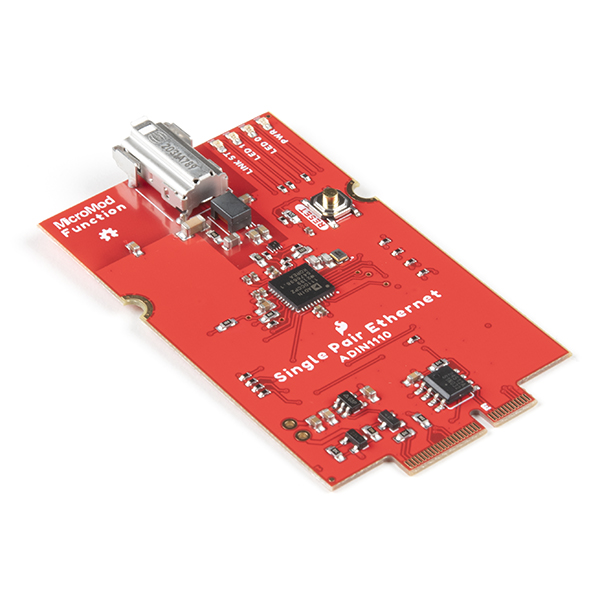
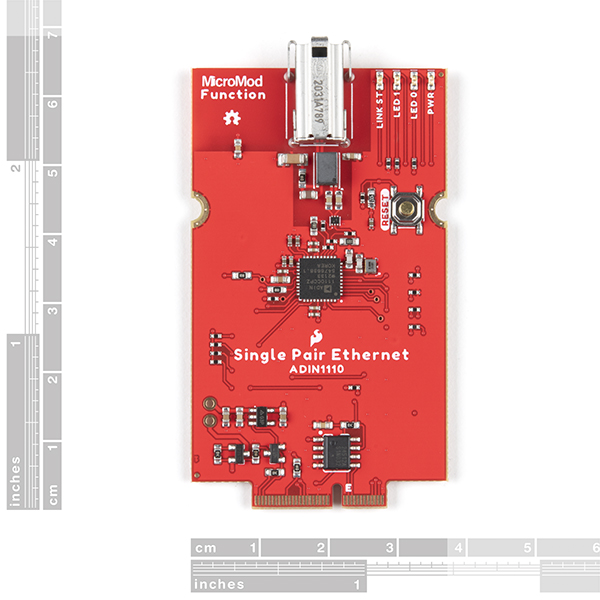
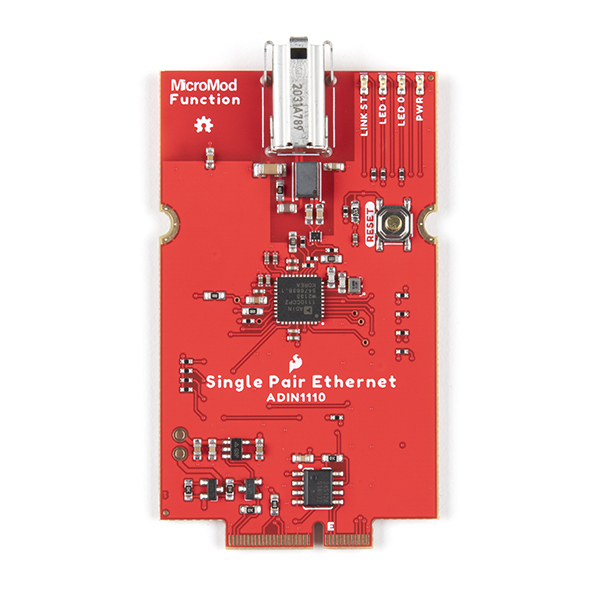
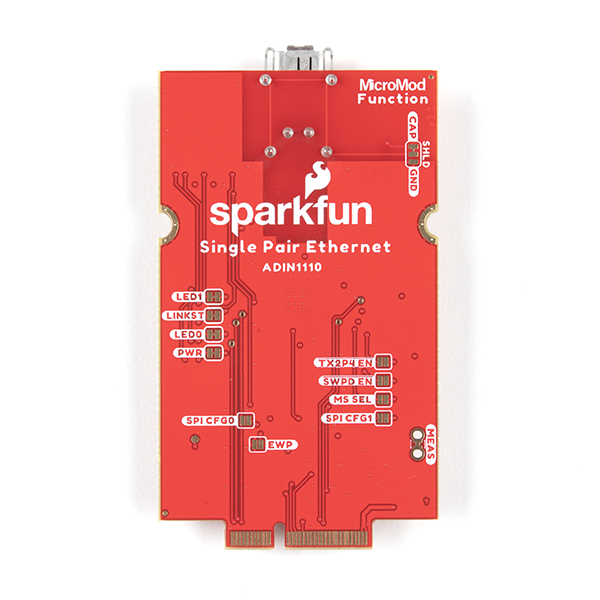
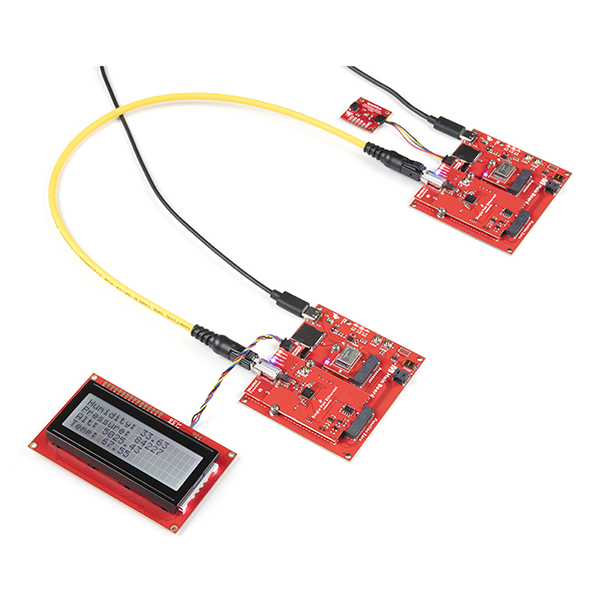
Which MicroMod targets work with the Single Pair Ethernet Arduino library ? It seems RP2040 does not have Arduino support and ESP32 is not supported with the SparkFun ADIN1110 SPE library for Arduino.
TI's Design Guide TIDA-010076 for Daisy-Chained Power and Data Over Single Pair Ethernet (T1) Reference Design describes an SPE implementation with power delivery based on their DP83TC811 100Base-T1 transceiver. It shouldn't be too difficult for Sparkfun to adapt it to use the ADI ADIN1110 transceiver instead. Some component values may need to be changed to allow for the lower bit rate of the 10Base-T1L ADIN1110 (10 Mb vs. 100 Mb) but the design principles are essentially the same. See this TI app note.
With power delivery over the same pair of wires that are used for the Ethernet (PoDL - Power over Data Lines), then you'd really have something useful for robotics and home automation! That's what the automotive and process control industries are moving towards for sensor/camera connectivity. See this ADI article.
Do you have any recommendations for some skinny two-wire cables that can be used to connect one of these out to say, 50 meters? Would coax work?
Coax would be asking for trouble. The cable should really be a 100ohm twisted pair. A shield for the cable is optional per the standard, and whether or not you need one really depends on how electromagnetically noisy your environment is. With the shield this cable is often sold as "twinaxial" cable. Here is one example that you can get in less than an entire spool.
At least right now, the lowest cost option for the average home user might be to just get some CAT5 cable and only use one twisted pair. It seems kind of silly, but its just so much easier to find. Hopefully if 10BASE T1L takes off the dedicated cabling will become more common.
One of the beauties of remote devices over Single Pair Ethernet is the power delivery. Is a howto regarding this described somewhere?